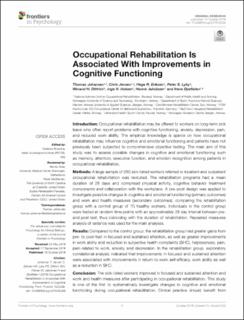| dc.description.abstract | Introduction: Occupational rehabilitation may be offered to workers on long-term sick leave who often report problems with cognitive functioning, anxiety, depression, pain, and reduced work ability. The empirical knowledge is sparce on how occupational rehabilitation may influence cognitive and emotional functioning and patients have not previously been subjected to comprehensive objective testing. The main aim of this study was to assess possible changes in cognitive and emotional functioning such as memory, attention, executive function, and emotion recognition among patients in occupational rehabilitation.
Methods: A large sample of 280 sick-listed workers referred to inpatient and outpatient occupational rehabilitation was recruited. The rehabilitation programs had a mean duration of 28 days and comprised physical activity, cognitive behavior treatment components and collaboration with the workplace. A pre–post design was applied to investigate possible changes in cognitive and emotional functioning (primary outcomes) and work and health measures (secondary outcomes), comparing the rehabilitation group with a control group of 70 healthy workers. Individuals in the control group were tested at random time points with an approximately 28 day interval between pre- and post-test, thus coinciding with the duration of rehabilitation. Repeated measures analysis of variance was used for the main analyses.
Results: Compared to the control group, the rehabilitation group had greater gains from pre- to post-test in focused and sustained attention, as well as greater improvements in work ability and reduction in subjective health complaints (SHC), helplessness, pain, pain related to work, anxiety, and depression. In the rehabilitation group, exploratory correlational analysis indicated that improvements in focused and sustained attention were associated with improvements in return-to-work self-efficacy, work ability as well as a reduction in SHC.
Conclusion: The sick-listed workers improved in focused and sustained attention and work and health measures after participating in occupational rehabilitation. This study is one of the first to systematically investigate changes in cognitive and emotional functioning during occupational rehabilitation. Clinical practice should benefit from increased knowledge about all cognitive functions and should be specifically aware of the improvements in focused and sustained attention, while memory, executive function and emotion recognition remained unchanged. The results can be used as a motivation to tailor specific interventions to gain further improvements in all cognitive and emotional functions. | |

